Yes, allergies can cause hearing loss and tinnitus. A Firat University study was conducted on 31 patients who were diagnosed with sudden hearing loss.
The study results showed a correlation between allergies and sudden hearing loss in 61.9% of the patients.
Tinnitus, which is most commonly referred to as ringing in the ears, can be caused by allergies. Tinnitus has many other possible causes like medications, ear abnormalities, and hearing loss.
Hearing loss and tinnitus are not always linked to allergies, allergies are just one of many conditions that can cause hearing troubles. Prepare to learn even more about how your allergies and hearing may be related.

As an Amazon Associate, I earn from qualifying purchases.
How Do Allergies Cause Hearing Loss and Ringing in the Ears?
Allergies usually give us symptoms of runny noses, cough, itchy/watery eyes, and sneezing. Due to the proximity to the ears, your allergy symptoms can affect your hearing. Just like with a cold, these symptoms can cause our ears to become stuffy and cause temporary hearing loss, or even ringing in the ears.
Losing some of your ability to hear clearly while sick or every once in a while from allergies, usually isn’t something too concerning as your hearing should come back as the symptoms fade.
Chronic Inflammation and Hearing Loss
The Department of Otolaryngology believes that there is a correlation between Chronic Rhinosinusitis (chronic sinus inflammation) and sensorineural hearing loss.
A study was completed with 103 patients who met the chronic rhinosinusitis (CRS) definition. The study team defines CRS as “Persistent inflammation of the nasal cavity and sinus mucous membranes for more than 12 weeks.”. The results of the study revealed that outer hair cell injury and hearing long may have a common cause in patients with CRS.
Symptoms of Hearing Loss
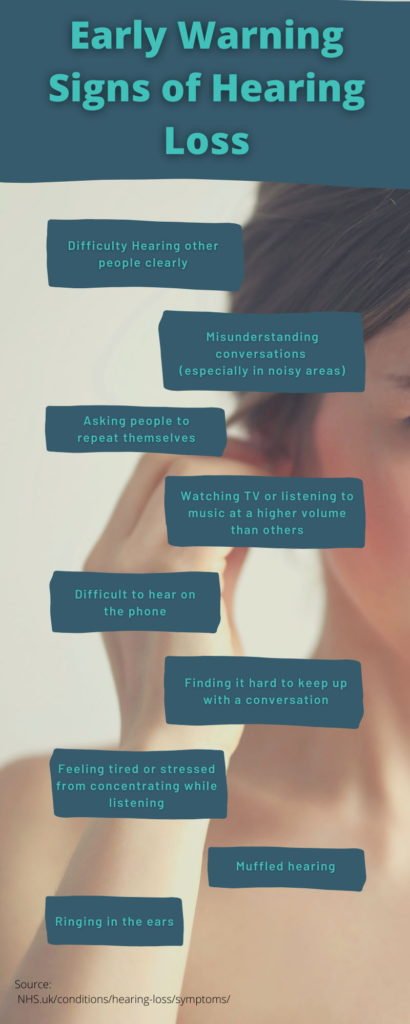
NHS.uk explains that there are a few different symptoms and warning signs of hearing loss. With my experience in Public Health, I have given thousands of hearing tests, and these are the types of topics we would discuss with the patients.
Early warning signs of hearing loss:
- Difficulty hearing other people clearly
- Misunderstanding conversations (especially in noisy areas)
- Asking people to repeat themselves
- Watching TV or listening to music at a higher volume than others
- Difficult to hear on the phone
- Finding it hard to keep up with a conversation
- Feeling tired or stressed from concentrating while listening
- Muffled hearing
- Ringing in the ears
Hearing loss in general is something that usually happens slowly over time when you are exposed to loud noise.
Hearing loss that is not noise-induced can be caused by allergies, head trauma, medications, trouble with the mechanics inside your ears, diseases, and many other conditions.
Can Allergies Cause Inner Ear Problems?
Yes, allergies can cause inner, middle, and outer ear problems. Healthy Hearing states that your outer ear (the part you can see) can have an allergic reaction to detergents, fragrances, earrings, and pet dander.
Your allergies can cause swelling and itching of the ears, and ear canal.
The middle ear might become blocked if the outer ear swells enough. This swelling can shut off your Eustachian tube, which helps drain fluid from the ears.
When the fluid cannot drain your ears feel full, and this can lead to an ear infection.
The fluid buildup in your ears can throw off your balance, making you dizzy or feel lightheaded.
Healthy Hearing additionally explains that allergies might contribute to hearing loss for people with Meniere’s disease.
What is Meniere’s Disease?
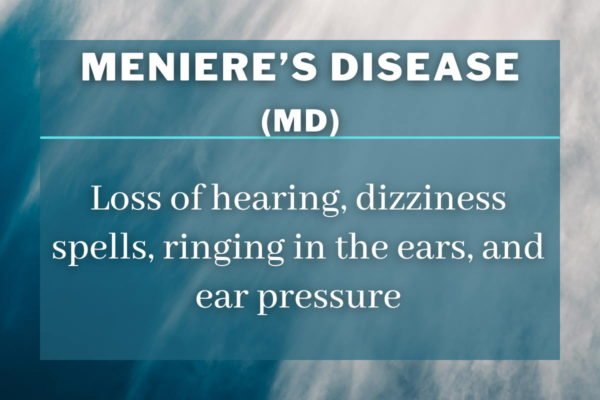
Meniere’s Disease (MD) is a condition that contains symptoms such as fluctuating sensorineural hearing loss, vertigo, tinnitus, and aural pressure. In layman’s terms, Meniere’s Disease can cause loss of hearing, dizziness spells, ringing in the ears, and ear pressure.
The Link Between Allergy and Meniere’s Disease (MD)
The study “The Link between Allergy and Meniere’s Disease” suggests there might be a link between allergies and MD.
This is suggested because there have been animal studies that prove allergic activity within the inner ear.
Further studies do need to be accomplished to actually prove the link between allergies and MD in humans.
Until then, MD is considered an idiopathic disease, meaning there is no known cause.
Science hasn’t proved a direct link (in humans) yet, but they do suggest that it might be a good idea to treat those with MD in a similar fashion as an allergy treatment (i.e., medications, immunotherapy, allergen avoidance).
How to Treat Hearing Loss Caused By Allergies
To treat temporary hearing loss and ringing in the ears caused by allergies, you need to treat the allergies. Here are some treatment ideas for you to discuss with your doctor.
Allergy-Related Hearing Loss Treatment Options
Antihistamines

There are many different types of antihistamines, and they can be taken in different ways. Some common antihistamines include diphenhydramine (Benadryl), cetirizine (Zyrtec), and loratadine (Claritin). Antihistamines can be taken as pills, liquids, or nasal sprays. They can also be injected, but this is not common.
Antihistamines work by blocking histamine receptors. Histamine is a chemical that is released during an allergic reaction. It causes the symptoms of allergies, such as itching, swelling, and runny nose. When histamine receptors are blocked, the symptoms of an allergy are less severe.
Antihistamines can be bought over the counter or prescribed by a doctor. Over-the-counter antihistamines are safe for most people to take. However, some people may have side effects from taking them, so talk to your doctor about treatment options.
Decongestants
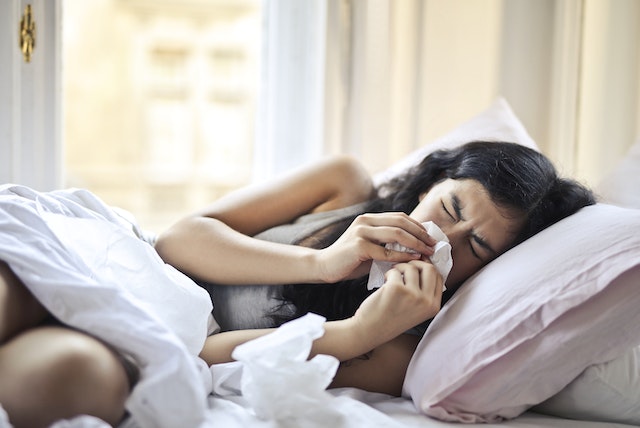
Decongestants help allergy treatment by helping to clear mucus from the nasal passages. This makes it easier to breathe and helps to reduce the symptoms of allergies. Some decongestants are available over the counter, while others require a prescription.
There are a few different types of decongestants, and they work in different ways. Some decongestants, like pseudoephedrine, work by constricting blood vessels. This decreases swelling in the nasal passages and makes it easier to breathe. Other decongestants, like antihistamines, work by blocking the action of histamine. Histamine is a chemical that is released during an allergic reaction and causes symptoms like sneezing and a runny nose.
Some allergy medications have decongestants already in them, so watch out and don’t double dose.
Medicated Nasal Sprays
When you have allergies, your body overreacts to things that are usually harmless. This can cause a lot of problems, like a runny nose, itchy eyes, trouble hearing, and sneezing. Medicated nasal sprays help to stop these symptoms by using an antihistamine, or by using corticosteroids which calm inflammation.
There are a lot of different kinds of nasal sprays, and they’re not all the same. Some work better for certain allergies than others. You might have to try a few before you find the one that works best for you.
The nasal spray that has worked best for me (for years and years) is Flonase (fluticasone propionate), which is available over the counter. Flonase can give you some relief within 12 hours of starting the medication, but full effects don’t kick in until about day 4.
Nasal Rinses
Nasal rinsing is where you rinse your sinuses out, usually with pH-balanced saltwater (does not burn). The goal is to flush the irritants and allergens from your sinuses to relieve allergy symptoms. There is a broad range of options on the market that fit all price points ($7-$110). Here are a few nasal rinse examples.
NeilMed Sinus Rinse Kit
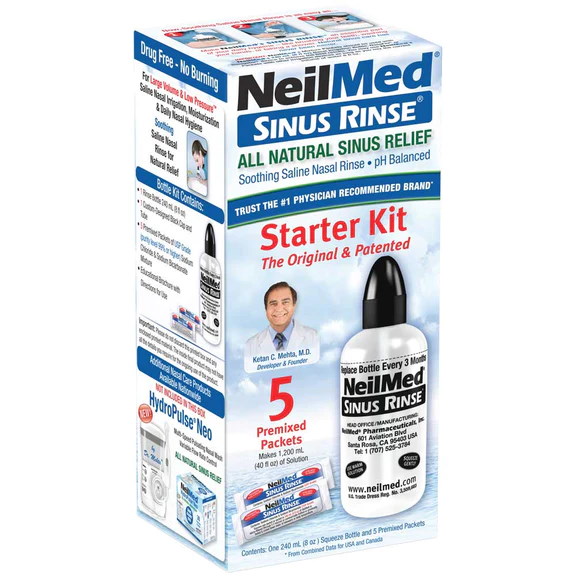
This kit contains everything you need for all-natural sinus relief, the cost is less than $10 on Amazon. If you are just starting out with using a nasal rinse, this would be the best place to start.
NeilMed Nasaflow Porcelain Neti Pot
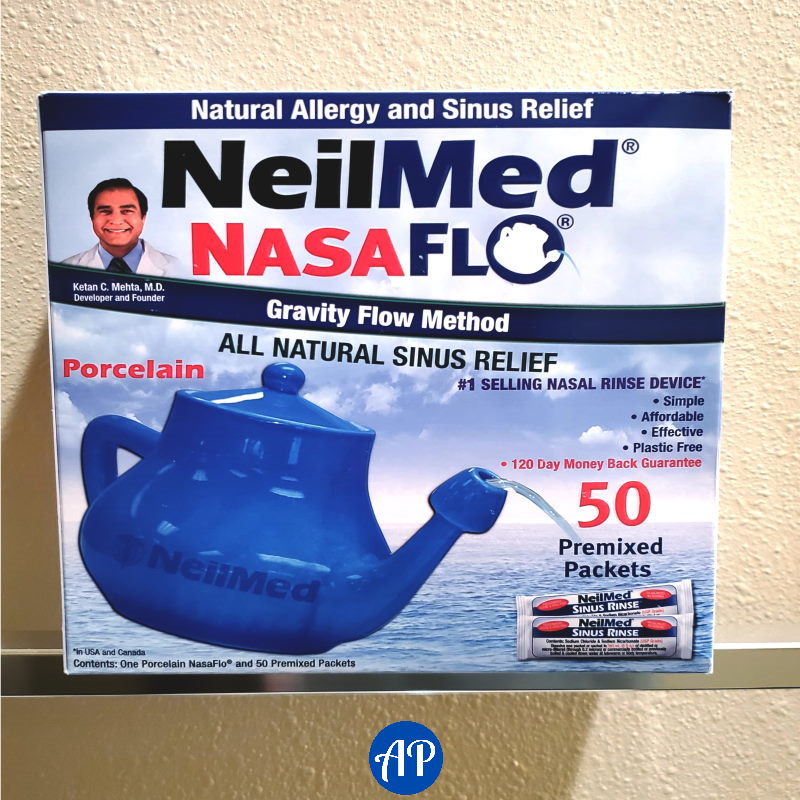
This is the exact nasal rinse I use, literally. I love this nasal rinse because it is not a plastic bottle, which I find easier to clean, and it’s super cheap to buy! You can get the pot and 50 packets of saline for under $15 on Amazon. Works great, try it out.
NeilMed Sinugator Cordless Pulsating Nasal Wash Kit
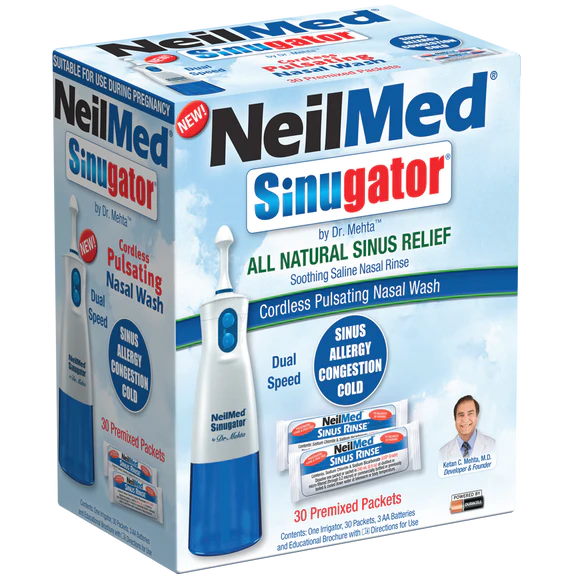
If you are looking for a nasal rinse that is a blend of all features and is affordable, check out the Sinugator nasal wash. It comes with an electronic irrigator, 30 premixed (all-natural) packets, and batteries. The best part is it’s less than $25 on Amazon.
Navage Nasal Care Starter Bundle
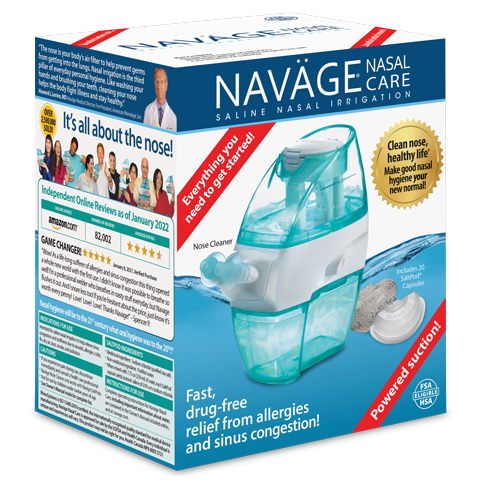
The Navage device is a nasal irrigation machine, that uses powered suction to clear the sinuses with saline solution. I like that it is powered so you don’t have to tilt your head over the sink like the other devices I have mentioned so far.
I have not tried the Navage yet, but it is the one I am most excited about. This will be on my wish list for sure. You can get this kit on Amazon for about $100. Have you tried one of these? Let me know your experience with it!
Treatment for Allergy-Induced Tinnitus
Treatment for allergy-induced tinnitus would start with the same treatment options as allergy treatments. The best way would be to avoid the allergens you are allergic to. You can also try:
- Allergy medications
- Nasal irrigation
- Immunotherapy (allergy shots)
Tinnitus can be caused by many different conditions, so these recommendations would only assist in treating allergy-related tinnitus.
Talk with your medical provider to see what the best option is for you.
How to Avoid Allergy-Induced Hearing Loss
The best option to help with allergy-induced hearing loss or ringing in the ears is avoiding the allergen that is triggering your symptoms. Sometimes you do not know what is causing your symptoms, or you simply cannot avoid the allergen. Here are some ways to help limit your allergen exposures.
Use A HEPA Filter/Air Purifier
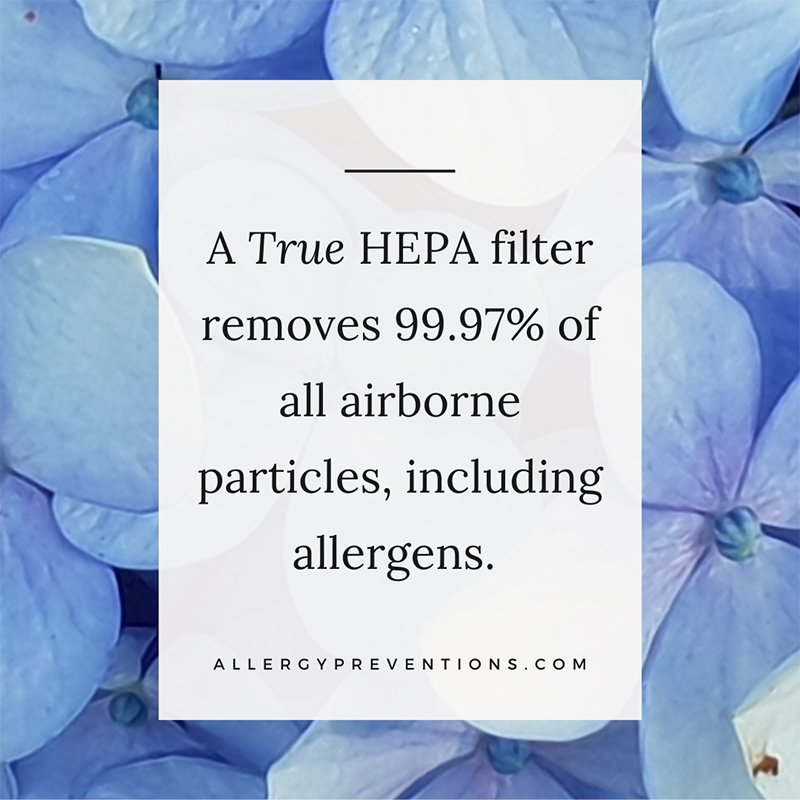
An air purifier cleans the air of airborne viruses and allergens alike. HEPA filter air purifiers can remove up to 99.97% of particles in the air.
Our family uses an air purifier, and it has been a game-changer. Here is my full review, WINIX PlasmaWave 5500-2 True HEPA Air Purifier Review
Cleaning Away Allergens
If you are like me, cleaning is not at the top of my to-do list. But, once I learned that cleaning can help relieve allergy symptoms I changed my mind.
Wipe down and clean horizontal surfaces often.
Surfaces begin to build up with dust, dander, pollen, and more. If these surfaces are not cleaned, any disruption to that dirty surface will send the allergens airborne.
A bit of warning: Make sure you are not using a harsh cleaner that could be irritating your sinuses or that you may be allergic to. Our family decided to make the switch to Force of Nature Cleaner, and we have not looked back since.
Force of Nature Cleaner For ALL Cleaning Needs
Force of Nature Cleaner/disinfectant is what you need for any type of cleaning, and it can be used on all surfaces.
This sanitizing cleaner also replaces all-purpose cleaners, window cleaners, carpet cleaners, and bathroom cleaners.
Quick Force of Nature Facts:
- Saves you money
- All-natural
- Made at home
- EPA-approved disinfectant (even against COVID-19 and Delta variant)
- Kid and Pet Safe
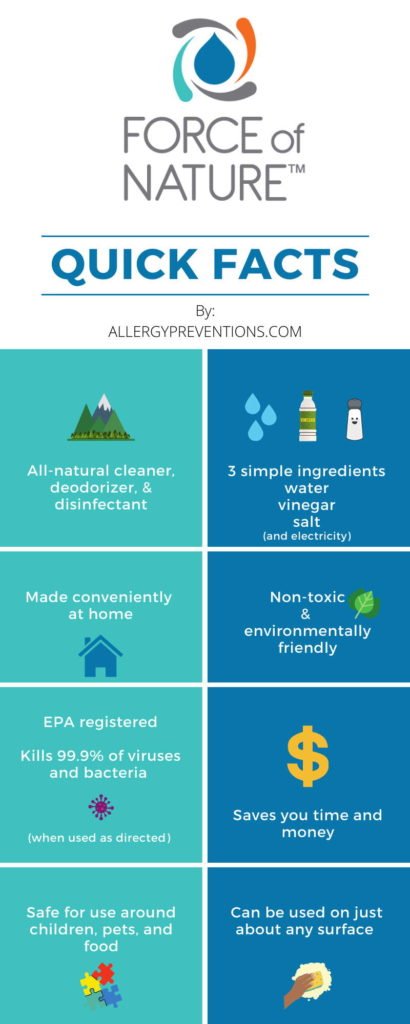
Check out 20 Reasons Force of Nature Cleaner is Legit
Change All Filters
Filters are our first line of defense against indoor allergens. Everything seems to have some sort of filter these days, make sure they are clean so they do not blow allergens around your home.
Check for filters in these areas:
- Vacuum cleaner
- Robot vacuum cleaner
- Heating/Cooling (HVAC system)
- AC window unit
- Air purifier
- Cabin Air Filter (in the car)
Wash Allergen Exposed Clothing
Do you have outdoor allergens and you just spent the day outside? You should change out of and wash your clothes after you have been exposed to your allergy triggers.
Allergens stick to clothes and can continuously make you symptomatic if you don’t change or wash the allergens away. Additionally, you may spread the allergens to other areas of your house if you do not change immediately.
Take a Shower
Taking a bath or shower can help greatly with allergen removal from your body. All allergen-exposed hair and skin can trap dander, mold, pollen, and more.
Keep Windows Closed
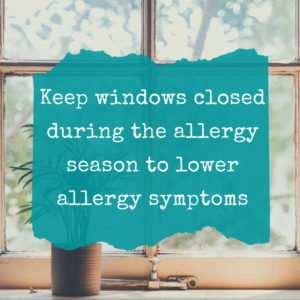
Fresh air is the greatest when you are in your car or home. But, this fresh air can cause severe allergic reactions during peak allergy seasons. When your windows are open, the allergens are rolling in, so keep the car and house windows closed as often as possible.
Allergies That Can Cause Hearing Loss
Any allergies that affect the middle or inner ear can cause hearing loss. Examples include seasonal, food, pet, and environmental allergies.
In extreme and rare cases, contact dermatitis (perfumes, lotions) or metal (earrings) allergies can lead to severe swelling and affect the middle ear. This swelling in the middle ear can cause temporary hearing loss.
Take Care of Hearing Aids During Allergy Season
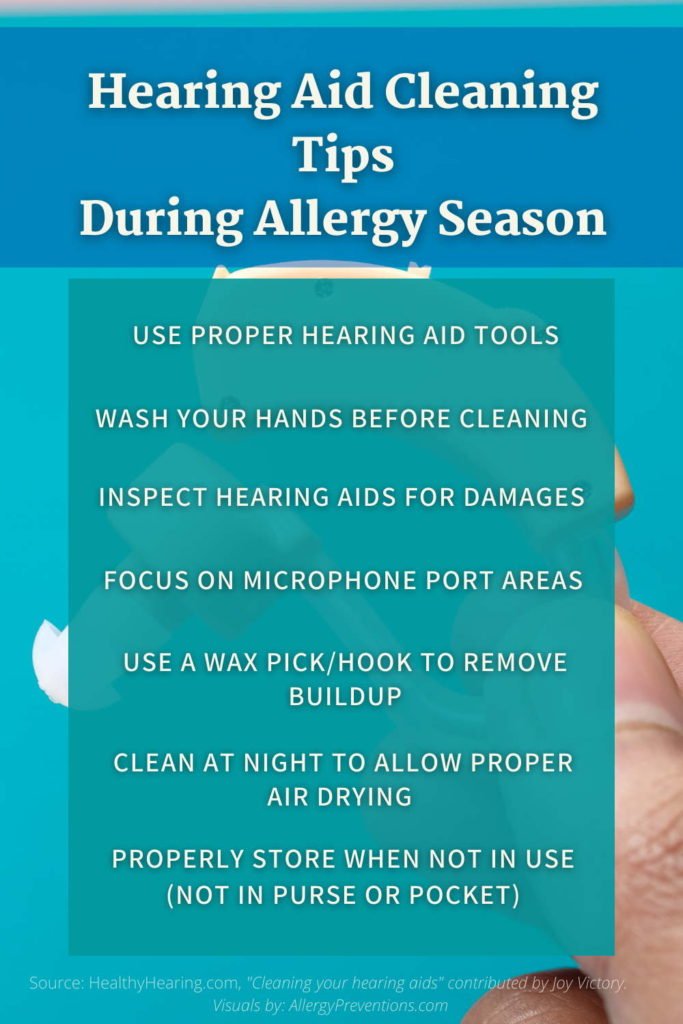
Hearing aid performance can be degraded during the allergy season. If you wear hearing aids, you need to ensure they are properly maintained.
Hearing aids need to have regular cleanings to perform at their best. A hearing aid that is clogged with ear wax or debris can make your hearing sound muffled.
I learned some great tips for cleaning hearing aids from healthyhearing.com, here are the highlights.
- Use the proper hearing aid cleaning tools
- Wash your hands before cleaning
- Inspect hearing aids for damages
- Focus on microphone port areas
- Use a wax pick or hook to remove buildup
- Clean hearing aids at night to allow for proper air drying
- Do not store hearing aids in pockets (gets dirty with lint and dust)
FAQs
These are the frequently asked questions as they relate to allergies and hearing loss.
Can hearing be affected by allergies?
Yes, the symptoms of allergies like congestion, watery eyes, and sinus pressure can become severe enough to cause changes in hearing.
Can allergies cause tinnitus in one ear?
Yes, allergies can cause tinnitus (ringing in the ears) in one or both ears.
Can allergies make you fail a hearing test?
Yes, if you are suffering from allergies you may fail a hearing test. The audiologist should recommend retesting when your symptoms resolve.
Final Thoughts
There you have it, allergies CAN cause hearing loss. If you are experiencing hearing loss, of course, go see your doctor. What has been your experience with allergy-related hearing loss? Send me a message: chris@allergypreventions.com
